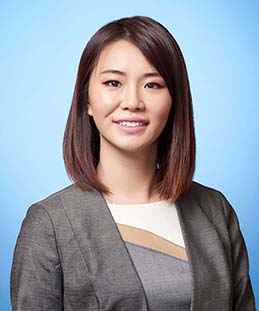
Dr. Emily Wu is a Child and Adolescent Psychiatrist at the Menninger Clinic, and is also an Assistant Professor at the Department of Psychiatry in Baylor College of Medicine. She is an alumna of the American Psychiatric Association MFP and received her M.D. in 2015 from Baylor College of Medicine.
Dr. Wu was drawn to the MFP because of her early immigration experiences. She stated, “As a first-generation immigrant child, I observed many new immigrant families suffered from tremendous emotional turmoil. However, I rarely knew any families who reached out for services that addressed their emotional or mental problems. The subject of mental health has always been taboo across many minority cultures. Despite the acknowledgment of their emotional distress, willingness to openly report problems and discuss them publicly is low due to the shame and stigma associated with psychological issues.” Her desire to improve mental health services for the underrepresented minorities directly aligned with the mission of the SAMHSA Minority Fellowship Program.
Dr. Wu initially envisioned herself as an advocate in public psychiatry policymaking who would develop a more culturally sensitive mental health system for the racial/ethnic minority communities. Her participation in the American Psychiatric Association (APA) MFP allowed her to gain hands-on experiences in the advocacy work at the APA Council on Minority Mental Health/Health Disparities, where she aided in developing an APA toolkit for Asian American mental health guidelines and organizing a community psychiatry outreach program in the underserved school districts. When asked how the MFP fellowship impacted her career goals, Dr. Wu shared, “My experiences in the APA Minority Fellowship Program not only broadened my mentorship network, but also sharpened my research and leadership skills in reducing mental health disparities for the minority communities.”
Participating in the MFP afforded Dr. Wu valuable opportunities to build and nurture her professional network. She was mentored through her participation in the APA Council during their September Component Meeting and monthly Council conference calls. During her tenure as an APA MFP fellow, she was introduced to the National Minority Mentor's Network; she served as the Chair of APA MFP 2018-2019; and she was appointed to sit on the APA Board of Trustees as a non-voting member, which furthered her understanding of the organizational work within the APA and APA Foundation. In addition, she built a lifetime peer mentorship network with many other passionate and like-minded APA MFP fellows. Dr. Wu added, “These valuable professional networks granted me many collaborative opportunities in the research, educational outreach, and policy advocacy fields.”
Dr. Wu has also been able to leverage the skills and knowledge she acquired during the MFP. She shared, “With the research grant provided by the APA SAMHSA MFP, I was able to develop a virtual-guided interactive mindfulness smartphone application, which aimed at providing a culturally-oriented tool to encourage mental health service engagement among Asian Americans. MFP sharpened my clinical and research skills to integrate digital psychiatry into the clinical practice, in order to improve the rate of help-seeking and follow-up in community psychiatric services.”
When asked what career building advice she would offer to the current MFP fellows, Dr. Wu says “MFP provides a great platform to exchange and collaborate on scholarly projects focusing on reducing minority health disparities. I would recommend the current MFP fellows to take advantage of the valuable professional mentorship network for their career development.” She would also encourage anyone who’s thinking about applying to the MFP to do so because it, “...provides valuable resources and professional networks to enhance Fellows' research, clinical, and leadership skill development.”
And in regard to the MFP agency that trained her, Dr. Wu shared that the “American Psychiatric Association did a wonderful job to train and nurture the MFP fellows. APA also provided various opportunities to encourage continued participation within the organization after the Fellows completed the MFP term.”